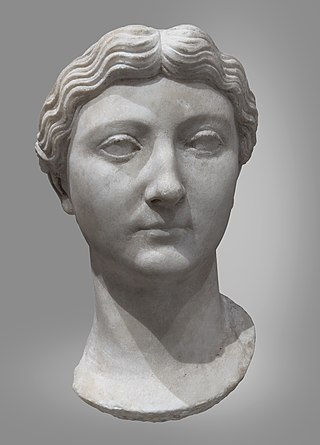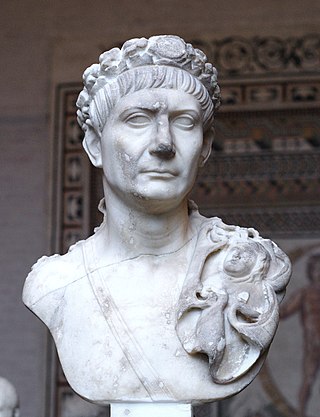Related Research Articles

Livia Drusilla was Roman empress from 27 BC to AD 14 as the wife of emperor Augustus. She was known as Julia Augusta after her formal adoption into the Julian family in AD 14.

The gens Livia was an illustrious plebeian family at ancient Rome. The first of the Livii to obtain the consulship was Marcus Livius Denter in 302 BC, and from his time the Livii supplied the Republic with eight consuls, two censors, a dictator, and a master of the horse. Members of the gens were honoured with three triumphs. In the reign of Augustus, Livia Drusilla was Roman empress, and her son was the emperor Tiberius.
Gaius Memmius was a Roman politician, orator and poet. He is most famous as the dedicatee of Lucretius' De Rerum Natura, and for his appearances in the poetry of Catullus.

The gens Licinia was a celebrated plebeian family at ancient Rome, which appears from the earliest days of the Republic until imperial times, and which eventually obtained the imperial dignity. The first of the gens to obtain the consulship was Gaius Licinius Calvus Stolo, who, as tribune of the plebs from 376 to 367 BC, prevented the election of any of the annual magistrates, until the patricians acquiesced to the passage of the lex Licinia Sextia, or Licinian Rogations. This law, named for Licinius and his colleague, Lucius Sextius, opened the consulship for the first time to the plebeians. Licinius himself was subsequently elected consul in 364 and 361 BC, and from this time, the Licinii became one of the most illustrious gentes in the Republic.

The gens Cornelia was one of the greatest patrician houses at ancient Rome. For more than seven hundred years, from the early decades of the Republic to the third century AD, the Cornelii produced more eminent statesmen and generals than any other gens. At least seventy-five consuls under the Republic were members of this family, beginning with Servius Cornelius Maluginensis in 485 BC. Together with the Aemilii, Claudii, Fabii, Manlii, and Valerii, the Cornelii were almost certainly numbered among the gentes maiores, the most important and powerful families of Rome, who for centuries dominated the Republican magistracies. All of the major branches of the Cornelian gens were patrician, but there were also plebeian Cornelii, at least some of whom were descended from freedmen.

Marcus Atilius Regulus was a Roman statesman and general who was a consul of the Roman Republic in 267 BC and 256 BC. Much of his career was spent fighting the Carthaginians during the first Punic War. In 256 BC, he and Lucius Manlius Vulso Longus defeated the Carthaginians at the massive naval battle off Cape Ecnomus; afterwards he led the Roman expedition to Africa but was defeated at the Bagradas River in spring of 255 BC. He was captured and then probably died of natural causes.

The gens Calpurnia was a plebeian family at ancient Rome, which first appears in history during the third century BC. The first of the gens to obtain the consulship was Gaius Calpurnius Piso in 180 BC, but from this time their consulships were very frequent, and the family of the Pisones became one of the most illustrious in the Roman state. Two important pieces of Republican legislation, the lex Calpurnia of 149 BC and lex Acilia Calpurnia of 67 BC were passed by members of the gens.
Lucius Julius Caesar was a Roman politician and senator who was elected consul of the Roman Republic in 64 BC. A supporter of his cousin, the Roman dictator Gaius Julius Caesar, Lucius was a key member of the senatorial coalition which strove to avoid civil war between the Roman Senate and his nephew Marcus Antonius in the aftermath of Caesar's assassination in 44 BC.
Marcus Atilius Regulus was a Roman politician and statesman. He was consul in 227 and 217 BC and later censor in 214 BC. He was the son of his homonymous father who was consul in 267 and 256 BC.
Alfidia was the mother of Rome's first empress, Livia. She is mistakenly called Aufidia by Suetonius, and this was assumed to be her name for centuries, but inscriptions found shows that her name was the rare nomen Alfidia.
Aemilia Tertia, properly Aemilia, was the wife of Scipio Africanus.

Naming conventions for women in ancient Rome differed from nomenclature for men, and practice changed dramatically from the Early Republic to the High Empire and then into Late Antiquity. Females were identified officially by the feminine of the family name, which might be further differentiated by the genitive form of the father's cognomen, or for a married woman her husband's. Numerical adjectives might distinguish among sisters, such as Tertia, "the Third". By the late Republic, women also often adopted the feminine of their father's cognomen.
Claudia Marcella Minor (PIR2 C 1103, born some time before 39 BC) was a niece of the first Roman emperor Augustus. She was the second surviving daughter of the emperor's sister Octavia the Younger and her first husband Gaius Claudius Marcellus. Marcella had many children by several husbands, and through her son Marcus Valerius Messalla Barbatus she became the grandmother of the empress Messalina.

The gens Antonia was a Roman family of great antiquity, with both patrician and plebeian branches. The first of the gens to achieve prominence was Titus Antonius Merenda, one of the second group of Decemviri called, in 450 BC, to help draft what became the Law of the Twelve Tables. The most prominent member of the gens was Marcus Antonius.

The gens Caecilia was a plebeian family at ancient Rome. Members of this gens are mentioned in history as early as the fifth century BC, but the first of the Caecilii who obtained the consulship was Lucius Caecilius Metellus Denter, in 284 BC. The Caecilii Metelli were one of the most powerful families of the late Republic, from the decades before the First Punic War down to the time of Augustus.

The gens Pomponia was a plebeian family at ancient Rome. Its members appear throughout the history of the Roman Republic, and into imperial times. The first of the gens to achieve prominence was Marcus Pomponius, tribune of the plebs in 449 BC; the first who obtained the consulship was Manius Pomponius Matho in 233 BC.

The gens Ulpia was a Roman family that rose to prominence during the first century AD. The gens is best known from the emperor Marcus Ulpius Trajanus, who reigned from AD 98 to 117. The Thirtieth Legion took its name, Ulpia, in his honor. The city of Serdica, modern day Sofia, was renamed as Ulpia Serdica.
The gens Poppaea was a minor plebeian family at ancient Rome. Members of this gens first appear under the early Empire, when two brothers served as consuls in AD 9. The Roman empress Poppaea Sabina was a descendant of this family, but few others achieved any prominence in the Roman state. A number of Poppaei are known from inscriptions. The name is sometimes confused with that of Pompeia.

The gens Munatia was a plebeian family at Rome. Members of this gens are first mentioned during the second century BC, but they did not obtain any of the higher offices of the Roman state until imperial times.
The gens Urgulania was an obscure plebeian family at ancient Rome. Few members of this gens are mentioned in history, of whom the most prominent was Urgulania, a friend of the empress Livia, and grandmother of Plautia Urgulanilla, the first wife of the emperor Claudius.